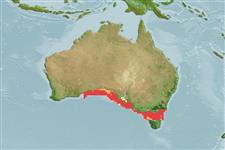Elasmobranchii (sharks and rays) >
Pristiophoriformes (Saw sharks) >
Pristiophoridae (Saw sharks)
Etymology: Pristiophorus: pristio-, presumably derived from prio (Gr.), to saw, but treated here as a noun (a saw); phorus, from phoreus (Gr.), bearer or carrier, referring to saw-like snout (note also that pristis is Greek for sawfish). (See ETYFish); nudipinnis: nudus (L.), bare or naked; pinnis (L.), fins, referring to most of dorsal fins and upper sides of pectoral fins being scaleless. (See ETYFish).
More on author: Günther.
Environment: milieu / climate zone / depth range / distribution range
Ecology
Marine; demersal; depth range 37 - 165 m (Ref. 247). Temperate; 31°S - 41°S, 125°E - 150°E (Ref. 54711)
Eastern Indian Ocean: endemic to Australia.
Length at first maturity / Size / Weight / Age
Maturity: Lm ?, range 90 - ? cm
Max length : 122 cm TL male/unsexed; (Ref. 247)
Found on the continental shelf (Ref. 6871, 75154). Ovoviviparous. Size at birth about 25 cm (Ref. 6871). Utilized fresh for human consumption.
Life cycle and mating behavior
Maturities | Reproduction | Spawnings | Egg(s) | Fecundities | Larvae
Ovoviviparous, embryos feed solely on yolk (Ref. 50449).
Compagno, L.J.V., 1984. FAO Species Catalogue. Vol. 4. Sharks of the world. An annotated and illustrated catalogue of shark species known to date. Part 1 - Hexanchiformes to Lamniformes. FAO Fish. Synop. 125(4/1):1-249. Rome, FAO. (Ref. 247)
IUCN Red List Status (Ref. 130435)
Threat to humans
Harmless
Human uses
Fisheries: minor commercial
Tools
Special reports
Download XML
Internet sources
Estimates based on models
Preferred temperature (Ref.
123201): 13.9 - 17.8, mean 15.3 °C (based on 71 cells).
Phylogenetic diversity index (Ref.
82804): PD
50 = 0.5156 [Uniqueness, from 0.5 = low to 2.0 = high].
Bayesian length-weight: a=0.00389 (0.00180 - 0.00842), b=3.12 (2.94 - 3.30), in cm total length, based on all LWR estimates for this body shape (Ref.
93245).
Trophic level (Ref.
69278): 4.0 ±0.6 se; based on size and trophs of closest relatives
Resilience (Ref.
120179): Low, minimum population doubling time 4.5 - 14 years (Fec assumed to be <100).
Fishing Vulnerability (Ref.
59153): High to very high vulnerability (73 of 100).
